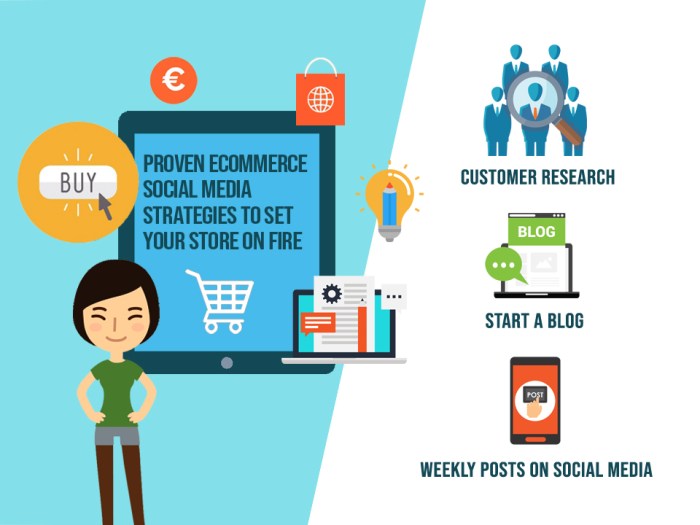
Step into the world of e-commerce marketing as we unravel the secrets behind successful social media strategies that drive sales and engagement. Get ready for a journey filled with tips, examples, and insights!
In today’s digital age, leveraging social media for e-commerce is crucial for reaching your target audience and increasing conversions. Let’s dive into the realm of social media marketing for online businesses and discover the power of a well-crafted strategy.
Social Media Marketing for E-commerce
Social media marketing plays a crucial role in the success of e-commerce businesses by helping them reach a wider audience, drive traffic to their websites, and ultimately increase sales.
Importance of Social Media Marketing for E-commerce
Social media platforms provide e-commerce businesses with a direct channel to engage with their target audience, build brand awareness, and drive conversions. By creating and sharing compelling content, businesses can connect with customers on a more personal level and establish a loyal customer base.
Examples of Successful Social Media Marketing Campaigns for E-commerce
- ASOS: The online fashion retailer ASOS leveraged user-generated content on Instagram to showcase real customers wearing their products, increasing engagement and driving sales.
- Sephora: Sephora’s Beauty Insider program encourages customers to share their beauty experiences on social media, creating a community of beauty enthusiasts and driving brand loyalty.
Role of Influencers in Social Media Marketing for E-commerce Brands
Influencers play a key role in social media marketing for e-commerce brands by promoting products to their followers and driving traffic to the brand’s website. Collaborating with influencers can help e-commerce businesses reach a larger audience and build credibility with potential customers.
Tips for Creating Engaging Content for Social Media Marketing in E-commerce
- Understand your target audience and tailor your content to their interests and preferences.
- Use high-quality visuals, such as images and videos, to grab the attention of users scrolling through their feeds.
- Run contests, giveaways, and promotions to incentivize engagement and encourage user participation.
- Utilize user-generated content to showcase authentic experiences and build trust with your audience.
Marketing E-commerce

In the world of e-commerce, marketing plays a crucial role in driving traffic, increasing sales, and building brand awareness. Let’s explore the key aspects of marketing for e-commerce businesses.
Key Differences Between Traditional Marketing and E-commerce Marketing
Traditional marketing and e-commerce marketing differ in several key ways. While traditional marketing relies heavily on print ads, TV commercials, and billboards, e-commerce marketing leverages digital channels such as social media, email campaigns, and search engine optimization. E-commerce marketing is more targeted, measurable, and cost-effective compared to traditional marketing methods.
Effective Marketing Strategies for E-commerce Businesses
Effective marketing strategies for e-commerce businesses include:
- Search Engine Optimization () to improve website visibility
- Content marketing to engage and educate customers
- Social media marketing to reach a wider audience
- Email marketing to nurture leads and drive sales
- Influencer marketing to leverage the reach of popular influencers
Impact of Mobile Marketing on E-commerce Sales
Mobile marketing has a significant impact on e-commerce sales, as more consumers are using their smartphones and tablets to shop online. E-commerce businesses need to optimize their websites for mobile devices, create mobile-friendly ads, and implement mobile payment options to cater to the growing number of mobile shoppers.
Innovative Marketing Techniques by Successful E-commerce Brands
Successful e-commerce brands have implemented innovative marketing techniques to stand out in a crowded marketplace. Examples include:
- Personalized product recommendations based on customer preferences
- Interactive social media campaigns to engage and delight customers
- Augmented reality experiences for a more immersive shopping journey
- Collaborations with micro-influencers to reach niche audiences
Advertising
Advertising plays a crucial role in driving e-commerce sales by increasing brand visibility, attracting potential customers, and promoting products or services. It helps businesses reach a larger audience and generate leads that can eventually convert into sales.
Various Advertising Channels
- Social Media Advertising: Platforms like Facebook, Instagram, and Twitter offer targeted advertising options to reach specific audiences based on demographics, interests, and behavior.
- Search Engine Marketing (SEM): Utilizing platforms like Google Ads to display ads on search engine result pages can help drive traffic to e-commerce websites.
- Display Advertising: Banner ads on websites, mobile apps, or social media platforms can increase brand visibility and drive traffic to e-commerce sites.
- Email Marketing: Sending promotional emails to subscribers can help nurture leads and encourage repeat purchases.
- Influencer Marketing: Collaborating with influencers to promote products or services to their followers can increase brand credibility and drive sales.
Effectiveness of Traditional vs. Digital Advertising
Traditional advertising methods like print ads, TV commercials, and radio spots can still be effective in reaching a broad audience, but digital advertising offers more targeted and measurable results. Digital advertising allows businesses to track metrics like click-through rates, conversion rates, and return on investment more accurately.
Tips for Creating Compelling Advertising Campaigns
- Identify your target audience and tailor your ads to their preferences and behaviors.
- Create eye-catching visuals and compelling copy to grab the audience’s attention.
- A/B test different ad variations to optimize performance and maximize ROI.
- Utilize retargeting strategies to reach customers who have previously interacted with your brand.
- Monitor and analyze the performance of your ads regularly to make data-driven decisions and adjustments.
Affiliate Marketing
Affiliate marketing is a performance-based marketing strategy where businesses pay affiliates for driving traffic or sales to their website through the affiliate’s marketing efforts. In the e-commerce industry, affiliate marketing plays a crucial role in promoting products and increasing sales.
Benefits of Implementing an Affiliate Marketing Program
- Affiliate marketing helps expand the reach of e-commerce businesses by leveraging the audience and influence of affiliates.
- It is a cost-effective way to market products as businesses only pay affiliates for the actual sales or leads generated.
- Affiliate marketing can boost brand credibility and trust as customers are more likely to make a purchase based on recommendations from affiliates.
- It provides valuable data and insights on customer behavior and preferences through affiliate tracking and analytics.
Finding and Selecting the Right Affiliates
- Identify affiliates who have a relevant audience that aligns with your target market and product niche.
- Look for affiliates with a good track record of driving sales and conversions in the e-commerce industry.
- Consider the affiliate’s marketing channels, content quality, and engagement levels to ensure they can effectively promote your products.
- Establish clear communication and terms with affiliates to set expectations and goals for the partnership.
Successful Affiliate Marketing Strategies in E-commerce
- Offering competitive commission rates and incentives to motivate affiliates to promote your products actively.
- Providing affiliates with high-quality promotional materials, such as banners, product images, and exclusive deals, to enhance their marketing efforts.
- Implementing affiliate tracking and analytics tools to monitor performance, optimize campaigns, and ensure transparency in commission payouts.
- Collaborating with influencers and bloggers as affiliates to leverage their audience and credibility in the e-commerce space.
Branding
Branding plays a crucial role in the success of an e-commerce business by shaping customer perception and creating a unique identity in a crowded market. A strong brand identity helps in building trust, loyalty, and recognition among customers, ultimately leading to increased sales and growth.
Importance of Branding in E-commerce
Branding in e-commerce is essential as it differentiates a business from its competitors, establishes credibility, and creates a lasting impression on customers. A well-defined brand identity helps in creating a consistent experience for customers across various touchpoints, including social media platforms, websites, packaging, and customer service interactions.
- Consistency in messaging and visual elements is key to maintaining a strong brand identity.
- Branding helps in creating an emotional connection with customers, leading to brand loyalty and advocacy.
- Strong branding can command premium pricing and set a business apart in a competitive market.
Strategies for Building a Strong Brand Identity
Building a strong brand identity for an e-commerce business involves several key strategies, including:
- Developing a unique brand voice and tone that resonates with the target audience.
- Creating a memorable logo and visual elements that reflect the brand’s values and personality.
- Consistently delivering on brand promises and values to build trust and credibility.
- Engaging with customers through storytelling and authentic content to humanize the brand.
Examples of E-commerce Brands with Exceptional Branding Strategies
Some e-commerce brands that have excelled in building a strong brand identity include:
- Warby Parker: Known for its socially conscious mission and affordable, stylish eyewear.
- Glossier: Emphasizes simplicity, inclusivity, and authenticity in its beauty products and marketing.
- Allbirds: Focuses on sustainability, comfort, and transparency in its environmentally friendly footwear.
Tips for Maintaining Brand Consistency Across Social Media Platforms
Maintaining brand consistency across various social media platforms is crucial for e-commerce businesses to reinforce their brand identity. Some tips to achieve this include:
- Use consistent brand colors, typography, and imagery across all social media channels.
- Create a content calendar to ensure a consistent posting schedule and messaging tone.
- Engage with followers authentically and respond to comments and messages promptly.
- Monitor brand mentions and reviews to address any inconsistencies or negative feedback promptly.
Direct Marketing

Direct marketing is a strategy used by e-commerce businesses to communicate directly with potential customers through various channels, such as email, SMS, social media, and targeted online ads. This approach allows companies to personalize their messages based on customer data and behavior, increasing the chances of conversion and customer engagement.
Types of Direct Marketing Techniques
- Email Marketing: Sending personalized emails to customers with product recommendations, promotions, and updates.
- SMS Marketing: Sending text messages to customers with special offers, discounts, and reminders.
- Social Media Advertising: Targeting specific audiences on social media platforms with sponsored posts and ads.
- Retargeting Campaigns: Showing ads to users who have previously visited the website but did not make a purchase.
Successful Direct Marketing Campaigns
- Amazon: Personalized product recommendations based on customer browsing history and purchase behavior.
- Sephora: Sending targeted emails with beauty tips, product recommendations, and exclusive offers to loyalty program members.
- Dollar Shave Club: Using humorous and engaging videos in social media ads to attract and retain customers.
Tips for Personalizing Direct Marketing Efforts
- Segment Your Audience: Divide customers into groups based on demographics, behavior, and preferences for targeted messaging.
- Use Personalization Tokens: Address customers by their name and tailor content based on their past interactions with the brand.
- A/B Testing: Experiment with different messaging, visuals, and offers to see what resonates best with your audience.
- Monitor and Analyze: Track the performance of your campaigns, analyze customer feedback, and adjust strategies accordingly for better results.
Internet Marketing
Internet marketing plays a crucial role in driving traffic and sales for e-commerce websites. By leveraging various online channels, businesses can reach a wider audience and increase their online presence. Let’s explore the different internet marketing strategies that can benefit e-commerce businesses.
Various Internet Marketing Channels
- Social Media Marketing: Utilizing platforms like Facebook, Instagram, and Twitter to engage with customers and promote products.
- Content Marketing: Creating valuable and relevant content to attract and retain customers, such as blog posts, videos, and infographics.
- PPC Advertising: Running pay-per-click campaigns on search engines and social media platforms to drive targeted traffic to the website.
- Affiliate Marketing: Partnering with influencers or other websites to promote products in exchange for a commission on sales.
Effectiveness of , SEM, and Email Marketing
- (Search Engine Optimization): Optimizing website content to improve search engine rankings and organic traffic.
- SEM (Search Engine Marketing): Using paid search advertising to increase visibility on search engine results pages.
- Email Marketing: Sending targeted emails to customers to promote products, announce sales, and build customer relationships.
Tip: Optimize your website for mobile devices, as a large portion of e-commerce traffic comes from mobile users.
Mailing Lists
Email marketing is a crucial component of e-commerce marketing strategy, and mailing lists play a vital role in reaching out to potential customers and nurturing relationships with existing ones.
Importance of Mailing Lists in E-commerce Marketing
- Allows direct communication with customers
- Helps in building brand loyalty
- Increases repeat purchases
- Drives traffic to the e-commerce website
Strategies for Growing and Segmenting Mailing Lists
- Offer incentives like discounts or exclusive content for signing up
- Use pop-ups or subscription forms strategically on the website
- Segment lists based on customer behavior, preferences, or purchase history
- Personalize emails for better engagement
Examples of Successful Email Marketing Campaigns for E-commerce Brands
- Amazon: Personalized product recommendations based on past purchases
- Sephora: Sending birthday discounts and beauty tips to customers
- ASOS: Abandoned cart emails with product reminders and discounts
Tips for Creating Compelling Email Content
- Use catchy subject lines to increase open rates
- Include visually appealing images and videos
- Keep the content concise and focused
- Add a clear call-to-action for better conversion rates
Last Point
From influencers to engaging content, we’ve covered it all in our exploration of social media marketing for e-commerce. Embrace these insights, unleash your creativity, and watch your online business thrive in the competitive digital landscape.
FAQ Corner
How important is social media marketing for e-commerce businesses?
Social media marketing is essential for e-commerce businesses as it helps in reaching a wider audience, increasing brand awareness, and driving sales.
What are some tips for creating engaging content for social media marketing in e-commerce?
Some tips include using high-quality visuals, storytelling, engaging with your audience, and creating interactive posts like polls and contests.
How does branding impact customer perception in e-commerce?
Branding plays a crucial role in shaping how customers perceive your e-commerce business, influencing their trust, loyalty, and overall experience.
What are the key differences between traditional marketing and e-commerce marketing?
Traditional marketing focuses on offline channels like print and TV, while e-commerce marketing leverages digital platforms for online sales and customer engagement.





